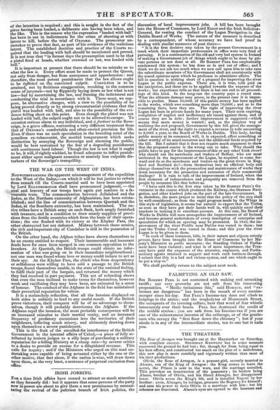THE WAR ON THE WEST OF INDIA.
NOTWITHSTANDING the apparent mismanagement of the expedition to the West of the Indus,—on which it will be but justice to refrain from remark till the Courts-martial said to have been appointed by Lord ELLE/CROW/UGH shall have pronounced judgment, — the uzeal and bravery of our troops have again put matters in a fa- durable train. The communication between Jellalabad and the Indus, at the Northern extremity of Afghanistan, has been reesta- blished; and the line of communication between Quettah and the Indus, at the Southern extremity, has been maintained. The na- tive tribes have a British army on each flank, both amply furnished with treasure, and in a condition to draw steady supplies of provi- sions from the fertile countries which form the basis of their opera- tions ; the one flushed with its victory at the Khyber Pass, the other obstructed but not defeated. Midway between these armies, the rich and important city of Candahar is still in the possession of the British.
On the other hand, the Afghan tribes have shown themselves to be an enemy entitled to respect. Their innumerable and incessant feuds have for once been merged in one common opposition to the invaders. At Quettah, the British troops could obtain no infor- mation of what was going on in their immediate neighbourhood ; not one man was found whom love or money could induce to act as their spy. At the Khyber Pass, the chiefs who from despondency or selfishness were willing to have sold a passage to the British troops, found themselves unable, in the state of the national feeling, to fulfil their part of the bargain, and returned the money which they had received in part payment. This act of refunding shows that even the men inclined to make terms for themselves, however weak and vacillating they may have been, are animated by a sense of honour. The conduct of the Afghans in the field has maintained their proverbial reputation for valour. i
It is a melancholy reflection, that all the heroism displayed on both sides is unlikely to lead to any useful result. If the British prove victorious, their conquest will be of no advantage to them- selves, though it will probably deteriorate the Afghans. If the Afghans repel the invasion, the most probable consequence will be an increased stimulus to their martial vanity, and an increased frequency of predatory excursions into the territories of their neighbours, inflicting much misery, and ultimately drawing down upon themselves a severe punishment.
This is the fruit of the uncalled-for interference of the British Government in the internal affairs of Cabul,—a piece of folly at- tributed by lenient judges to a silly hope of purchasing a military reputation for a falling Ministry at a cheap rate—by severer critics to a desire to provide an excuse for a dilapidated revenue. This calls for inquiry ; and if the Ministers who urged on this mad un- dertaking were capable of being actuated either by the one or the other motive, that fact alone, if the nation is wise, will draw down upon them, at the very least, a sentence of perpetual exclusion from office.


























 Previous page
Previous page